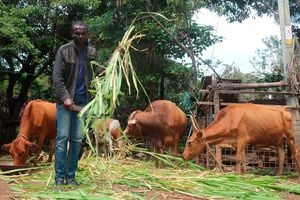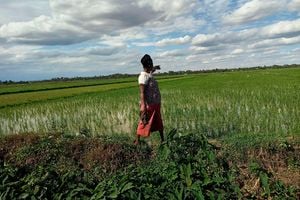
Soil Scientist Manoj Kaushal. He says a healthy soil is characterised by good organic matter.
Soil quality and health determine agricultural sustainability and environment quality, translating to improved food production. Seeds of Gold writer Francis Mureithi talked to Dr Manoj Kaushal, a soil scientist at the Alliance of Bioversity International and International Centre for Tropical Agriculture.
What is soil biodiversity?
It is the variety of life forms found in the soil. These include organisms like bacteria, fungi, insects, earthworms, mites, nematodes and plant roots. The organisms interact with one another and their environment to form a complex ecosystem that is crucial for soil health and plant productivity.
Why is soil biodiversity important in farming?
Key areas of soil biodiversity include micro-organisms – bacteria, fungi and actinomycetes. These are the most abundant micro-organisms in soil and are key for many functions, including decomposition of organic matter, nutrient recycling and formation of symbiotic relationships with plants.
Who should protect soil biodiversity?
This is a collective duty. Farmers should employ practices that are biodiversity-friendly, such as agroecology. Leaders should come up with policies that promote the same. Researchers and academia need to do studies and give possible interventions for soil in different regions. Extension officers should train farmers on the need for biodiversity conservation.
Can soil biodiversity influence long-term crop properties?
Beyond sustainable farm productivity, soil biodiversity influences long-term crop properties such as nutrient and anti-oxidant profiles. While providing training and knowledge on soil biodiversity to farmers, it is important to include these aspects.
What affects soil structural stability?
Roots are important as they influence soil structure, and availability of nutrients. They provide food and habitat for soil organisms. Mesofauna and macrofauna are the larger organisms found in soil such as ants, beetles and earthworms. These help in soil aeration, breaking down of organic material and cycling of nutrients.
What role does soil biodiversity play in an ecosystem?
Soil biodiversity contributes to critical ecosystem services, including nutrient cycling, water regulation, carbon sequestration and pests and disease suppression. Diversity in the soil ecosystem maintains soil structure and fertility. It builds resilience against environmental-related stresses like drought. Soil health is the basis of good crop productivity. The more biodiversity, the more fertile the soil, the better crop production and thus, economic empowerment among farmers and subsequent food and nutrition security.
What is a healthy soil?
A healthy human being means the person is fully functional. This is the same case with soil. A healthy soil has the ability to optimally function and perform the function of crop growth and full-potential production. It is when the soil can give back nutrients to the crop. A healthy soil is characterised by better organic matter, better water retention and is less susceptible to pests and diseases. It is also characterised by good farm productivity.
Soil biodiversity has reduced over the years. Why?
One issue that has affected soil biodiversity is the overuse and misuse of synthetic fertiliser. While there has been a push on the use of the fertiliser to boost crop production, its effect on soil biodiversity is rarely considered.
Another reason is the excessive tillage and use of heavy farm machinery. These affect soil structure.
Monocropping has affected soil biodiversity too. It leads to soil nutrient mining and reduces yield as the same amount of nutrients are pulled away by the same crop every season. It increases incidences of pests and diseases.
How has climate change affected soil biodiversity?
During droughts, temperatures are often too high while floods lead to the washing away of topsoil, which hosts biodiversity. Deforestation and pollution have also affected biodiversity, leading to soil degradation.
What are some misconceptions about soils?
One is that we do not have to take care of our soil as it will naturally take care of itself. There are sick soils. Taking car of soil means it will take care of us.
Why is soil conservation important?
Soil is one of the largest players in carbon sequestration, meaning soil takes in carbon dioxide from the atmosphere and stores it in the form of carbon, helping combat climate change. Soil conservation is important. It takes hundreds of years for an inch of soil to form.
Why should smallholder farmers embrace soil testing and prioritise soil health?
With the increasing pressure on land and a rapid climate change, smallholder farmers have no choice but to embrace critical ways of maintaining and improving soil health. Healthy soils produce better harvests. They translate to healthy crops that are resilient to extreme weather.
How do we enhance soil biodiversity?
Let’s embrace agroecology and sustainable farming. Conservational methods like mulching maintain soil moisture, and fertility, creating habitat for mesofauna.
Tillage should also be minimal. Farmers need to use organic manure instead of synthetic fertiliser.
How can behaviour change and sustainable farming maintain soil fertility?
Driving this agenda is easy with will and resources. In Kisumu, the Consortium of International Agricultural Research Centres Initiative on Nature-Positive Solutions has established two aggregated farms and a model farm in Vihiga. The 200 farmers under this initiative will do the same in their farms and train others.









